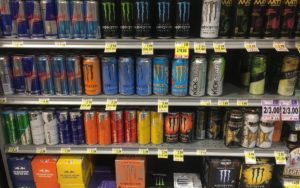
Getting adequate sleep is increasingly rare among the active duty military population, as frequent deviations from the body’s natural circadian rhythms due to a demanding operational tempo pit personnel in an ongoing struggle against the ever-persistent sandman.
To combat the sleep deprivation unique to this demographic, service members often turn to energy drinks, a prominent component of combat deployments that has become as paramount to mission success as any piece of protective gear or weaponry.
The prevalence of energy drink use in these settings is extraordinary. The life blood is virtually everywhere — and tends to cost nothing — resulting in an environment in which nearly half of deployed troops down at least one readily available crack can per day.
But while consuming these drinks may not hurt service members in their wallets, excessive use may very well be contributing to long-term mental and physical ailments, a recent study in the Military Medicine journal observed.
The authors of the study surveyed over 600 male infantry soldiers during a post-deployment period after the brigade combat team returned from a 12-month combat deployment to Afghanistan. Questions were designed to examine the association of energy drink use with sleep deprivation or insomnia, depression, anxiety, post-traumatic stress disorder, alcohol abuse, aggressive behaviors and fatigue.